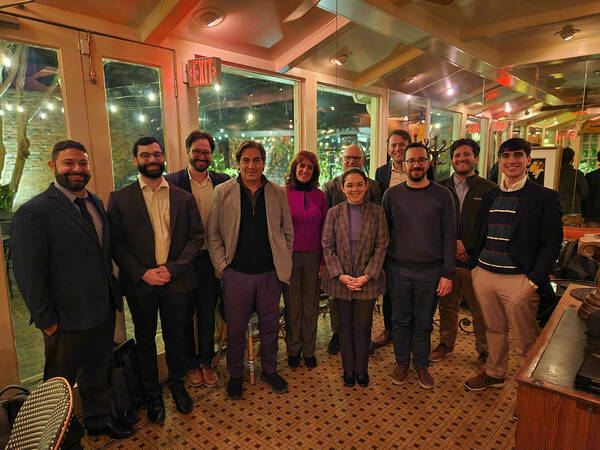
CCCG Post-Doctoral Fellow Luke Foster recently co-hosted the Traditions of Latin American Political Thought and Constitutionalism Conference in New Orleans, a conference hosted by the CCCG and the Center for the Study of Liberal Democracy at the University of Wisconsin-Madison. The conference was held within the Southern Political Science Association’s annual meeting, spanning January 12-13.
Attendees and presenters hailed from a range of countries including Argentina, Brazil, Colombia, Chile, Cuba, Mexico, and of course the United States. The goal of the conference was to bring these academics—senior faculty, junior faculty, and graduate students—together to discuss the Latin American intellectual tradition and combat misconceptions that it is alien to North American political thought and the Western tradition more broadly, according to Foster. Political Science Reviewer editor and Visiting Fellow with the CCCG in 2022-23, Richard Avramenko, was present to workshop the papers.
While the right and left in America both misunderstand Latin American thought, the truth is their canon shares much with our own—Spanish and Portuguese America also inherited political principles from Plato, Aristotle, Aquinas, and Montesquieu. In the era of independence and nation-building, The Federalist Papers, Burke, and Tocqueville were widely read. And Anglo-America and Latin America have intertwined histories in seeking to establish a stable republican constitutionalism. This continuity and these parallels make it imperative for today’s political theory to understand Latin American political thought in light of the history of Western civilization as a whole. This conference provided a rare setting for people who understand the tradition this way to present and workshop their ideas and give feedback to others. Scholars in attendance were invited to present papers to be workshopped and edited for release in a special issue of the Political Science Reviewer.
Foster offered a paper entitled “Lucas Alamán and Tocqueville: Federalism in Mexico” and was presented on the second panel “Latin American Thought in Comparative Perspective.” Other presenters on the panel included Brandon Westler from St. Olaf College, Pedro Gonzalez of Barry University, and Phillip Pinell of the University of Wisconsin-Madison. Foster believes that the story of Alamán, a nineteenth-century Mexican conservative statesman who admired the U.S. Constitution but believed on Tocquevillian grounds that constitutions depend on local culture, helps us understand the need for a strong but limited executive. Alamán shows how Tocqueville might have developed an account of the positive role of the state in promoting development, had he lived amid the instability of nineteenth-century Mexico.
Juan Vargas, a history PhD candidate here at Notre Dame, also attended the conference and presented on the first panel. His paper was titled “Republican Anarchy: Conservative Reflections in Post-Independence Colombia."
Eduardo Schmidt Passos of the University of Wisconsin-Madison presented a paper, “Tyranny in Americas: Sarmiento’s Tocquevillian Science and the Causes of Rosas’ Tyranny.” Passos said “At this conference, established faculty and early career scholars analyzed the contributions of Latin American intellectuals and statesmen to the large stream of Western political thought. For instance, my paper explored the parallels between Alexis de Tocqueville's fear of democratic despotism in North America and Domingo Faustino Sarmiento's struggle against the tyranny of the caudillos, which plagued the early days of the Argentine Republic.”
The keynote of the conference was presented by Diego von Vacano of Texas A&M University on “Power over Energy: Law, Resource Nationalism, and Latin America’s Central Role in the Global Climate Change Crisis.” Von Vacano showed how Machiavelli’s thought illuminated the strategy of Bolivian president Luis Arce to play the great powers of the United States, Russia, and China against each other in a bidding war for Bolivia’s resources.
Foster says he and others hope that releasing a whole issue of the journal dedicated to this Latin American theme will spark a whole broader line of research in this area and open up avenues of thinking for others who haven’t looked at the topic in this frame.
Papers are currently under their final revisions, and the special issue of the Political Science Reviewer is set to be published in June 2024.
This article was contributed by Merlot Fogarty, a CCCG Writing Fellow.